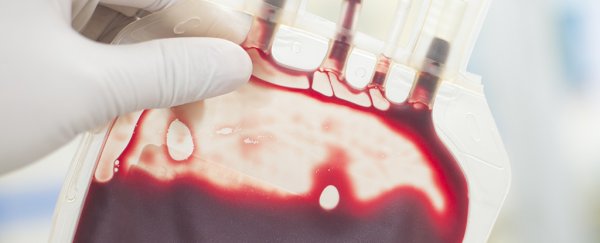Donor blood might not be as pure as you think – researchers studying 18 batches of blood discovered caffeine in all the samples, as well as traces of cough medicine and anti-anxiety drugs in many of them, too.
The analysis was made as part of a study into how botanical dietary supplements and other drugs can interact together in the body, using mass spectrometry to identify the chemical composition of the molecules in the blood samples.
What the scientists set out to do was identify how dietary supplements might have adverse effects when they mix with existing prescriptions. But the team also ended up discovering how our lifestyles cause changes that live on in the samples when we donate our bodily fluids.
Based on this sample, we're so keen on coffee, tea, chocolate, soda, and energy drinks that caffeine is literally running in our veins. Which may not be as problematic as it seems at first.
"From a contamination standpoint, caffeine is not a big worry for patients, though it may be a commentary on current society," says pharmacologist Luying Chen, from Oregon State University.
"But the other drugs being in there could be an issue for patients, as well as posing a problem for those of us doing this type of research because it's hard to get clean blood samples."
Besides the caffeine, which appeared in all the samples, 13 of the samples showed the presence of alprazolam, the anti-anxiety medicine sold under the name Xanax. Meanwhile, eight of the samples had traces of the over-the-counter cough medicine dextromethorphan.
As Chen says, this causes complications for blood transfusions as well as for medical research on blood samples – because researchers might not be starting from a clean state very often.
However, the team was able to successfully prove the effectiveness of their technique for measuring the presence of drugs in blood samples. That should make it easier to figure out how botanicals – natural products with drug-like activities – affect other compounds in the bloodstream.
"It's not straightforward or necessarily predictable, thus the need for methods to look for these interactions," says pharmacologist Richard van Breemen, from Oregon State University. "The odd thing in this case was finding all the tainted blood."
In the end the team behind the study had to enlist the help of two volunteers who promised to abstain from eating or drinking anything with caffeine before their blood was taken as a sample.
The number of samples in this case wasn't very big at all, so it's not comprehensive proof that caffeine is proliferating through blood donation bags worldwide. But it poses an interesting question on what exactly might be present in donated blood, whether it's being used for medical treatments or for further research.
"Another thing to consider is that we found drugs that we just happened to be looking for in doing the drug interaction assay validation – how many others are in there too that we weren't looking for?" says van Breemen.
The research has been published in the Journal of Pharmaceutical and Biomedical Analysis.
